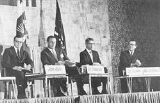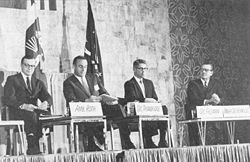
James J. Reynolds
Encyclopedia
James J. Reynolds was the Undersecretary of Labor for Labor-Management relations during the Lyndon B. Johnson
Administration in the United States
. Earlier he served as Assistant Secretary for Labor-Management Relations from 1961–65, initially for President John F. Kennedy
. Reynolds was an industrialist, and had been a member of the National Labor Relations Board
under President Harry S. Truman
.
 One of his most well-known moments came in April 1968, when Martin Luther King had gone to Memphis
One of his most well-known moments came in April 1968, when Martin Luther King had gone to Memphis
, Tennessee
to support African-American garbage workers during the Memphis Sanitation Strike
. They had walked off the job to "protest unsafe conditions, abusive white supervisors, low wages, and to gain recognition for their union."http://www.prospect.org/web/page.ww?section=root&name=ViewWeb&articleId=12380 King was assassinated on April 4. The next day, President Johnson instructed Undersecretary Reynolds to go to Memphis to mediate the conflict and settle the strike. It took him two weeks. The strike had been at a standoff given Memphis Mayor Henry Loeb
's adamant refusal to authorize automatic payment of union dues from the sanitation-workers' paycheck. Reynolds solved the impasse by using the Federal Credit Union
http://www.usfed.org, which is employee-owned but federally administered. Reynolds argued that the City of Memphis had no right to prevent its employees from designating some portion of their wages for the credit union. This offered a face-saving out for Loeb: wages were deducted for the credit union and then transferred for payment as union dues. Ultimately, the union was recognized and workers received a 5% raise, to $1.90/hour.http://www.time.com/time/magazine/article/0,9171,838423-4,00.html
Lyndon B. Johnson
Lyndon Baines Johnson , often referred to as LBJ, was the 36th President of the United States after his service as the 37th Vice President of the United States...
Administration in the United States
United States
The United States of America is a federal constitutional republic comprising fifty states and a federal district...
. Earlier he served as Assistant Secretary for Labor-Management Relations from 1961–65, initially for President John F. Kennedy
John F. Kennedy
John Fitzgerald "Jack" Kennedy , often referred to by his initials JFK, was the 35th President of the United States, serving from 1961 until his assassination in 1963....
. Reynolds was an industrialist, and had been a member of the National Labor Relations Board
National Labor Relations Board
The National Labor Relations Board is an independent agency of the United States government charged with conducting elections for labor union representation and with investigating and remedying unfair labor practices. Unfair labor practices may involve union-related situations or instances of...
under President Harry S. Truman
Harry S. Truman
Harry S. Truman was the 33rd President of the United States . As President Franklin D. Roosevelt's third vice president and the 34th Vice President of the United States , he succeeded to the presidency on April 12, 1945, when President Roosevelt died less than three months after beginning his...
.

Memphis, Tennessee
Memphis is a city in the southwestern corner of the U.S. state of Tennessee, and the county seat of Shelby County. The city is located on the 4th Chickasaw Bluff, south of the confluence of the Wolf and Mississippi rivers....
, Tennessee
Tennessee
Tennessee is a U.S. state located in the Southeastern United States. It has a population of 6,346,105, making it the nation's 17th-largest state by population, and covers , making it the 36th-largest by total land area...
to support African-American garbage workers during the Memphis Sanitation Strike
Memphis Sanitation Strike
The Memphis Sanitation Strike began on February 11, 1968 in Memphis, Tennessee. Citing years of poor treatment, discrimination, dangerous working conditions, and the recent work-related deaths of Echol Cole and Robert Walker, some 1300 black sanitation workers walked off the job in protest...
. They had walked off the job to "protest unsafe conditions, abusive white supervisors, low wages, and to gain recognition for their union."http://www.prospect.org/web/page.ww?section=root&name=ViewWeb&articleId=12380 King was assassinated on April 4. The next day, President Johnson instructed Undersecretary Reynolds to go to Memphis to mediate the conflict and settle the strike. It took him two weeks. The strike had been at a standoff given Memphis Mayor Henry Loeb
Henry Loeb
Henry Loeb III was the mayor of Memphis, Tennessee for two separate terms in the 1960s, from 1960 through 1963, and 1968 through 1971. He gained national notoriety in his second term for his role in opposing the demands of striking sanitation workers in February 1968...
's adamant refusal to authorize automatic payment of union dues from the sanitation-workers' paycheck. Reynolds solved the impasse by using the Federal Credit Union
Credit union
A credit union is a cooperative financial institution that is owned and controlled by its members and operated for the purpose of promoting thrift, providing credit at competitive rates, and providing other financial services to its members...
http://www.usfed.org, which is employee-owned but federally administered. Reynolds argued that the City of Memphis had no right to prevent its employees from designating some portion of their wages for the credit union. This offered a face-saving out for Loeb: wages were deducted for the credit union and then transferred for payment as union dues. Ultimately, the union was recognized and workers received a 5% raise, to $1.90/hour.http://www.time.com/time/magazine/article/0,9171,838423-4,00.html

